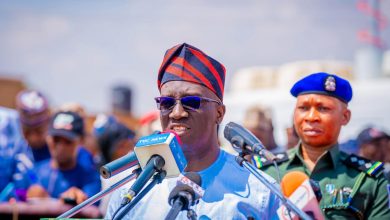Government Borrowing Hits ₦17.36 Trillion, 55% Above Target
Nigeria’s borrowing has exceeded expectations, reaching ₦17.36 trillion in just ten months.
Economists fear the rising debt could hurt the economy and increase financial pressure on citizens.
Nigeria’s borrowing spree has hit alarming levels, with the Federal Government reportedly securing ₦17.36 trillion in loans between January and October 2025, exceeding its ten-month borrowing target by 55.6 percent. The amount is ₦6.06 trillion higher than the ₦10.9 trillion planned under the 2025 Appropriation Act. With two months left in the year, analysts warn that total borrowing could reach nearly ₦21 trillion, representing close to 80 percent above the budgeted annual deficit target of ₦13.08 trillion.

According to available data, the government has raised ₦15.8 trillion from domestic investors and an additional ₦1.56 trillion from external sources within the period. In a further move to boost its coffers, the Federal Government last week began efforts to secure another $2.35 billion (₦3.384 trillion) through a Eurobond issuance. Should this deal succeed, it will push the country’s total borrowing for the year to around ₦20.74 trillion.
The 2025 budget approved total spending of ₦54.99 trillion, with expected revenue of ₦41.91 trillion, leaving a deficit of ₦13.08 trillion to be financed by debt. However, experts fear the country’s increasing reliance on loans could worsen its fiscal condition and heighten debt vulnerabilities.
Financial experts say the continuous borrowing, coupled with weak revenue performance, may drive Nigeria toward a debt trap. They caution that excessive dependence on loans could discourage foreign investors and limit private-sector access to credit, making it harder for businesses to expand or create jobs. They also warn that the situation undermines ongoing fiscal reform efforts supported by the International Monetary Fund (IMF).
Several analysts have linked the surge in borrowing to a mix of fiscal indiscipline, unrealistic revenue expectations, and rising debt service costs.
Andrew Uviase, Managing Partner at Ecovis OUC, said the trend reflects “fiscal indiscipline and poor expenditure control.” He argued that the government has failed to rein in spending, adding that without transparency and restraint, “excessive borrowing will continue because money is never enough.” Uviase also blamed insecurity and weak non-oil revenue for the government’s overreliance on debt.
Another analyst, David Adonri, Vice Executive Chairman of Highcap Securities, faulted what he described as “aggressive and unrealistic revenue assumptions,” especially oil-related projections. He noted that the budget was based on an expected oil production of 2.06 million barrels per day at $75 per barrel, whereas actual production has remained around 1.6 to 1.7 million barrels per day, with oil prices dropping to about $65. He warned that the government’s “addiction to debt” continues to weaken fiscal discipline.
Public policy commentator Clifford Egbomeade also linked the borrowing surge to low revenue and high debt service costs. He explained that reduced oil output, hovering between 1.35 and 1.4 million barrels per day, and persistent inflation have weakened consumer spending and lowered tax revenues. According to him, this forced the Treasury to rely heavily on domestic borrowing, where yields have risen to over 20 percent at bond auctions, while Eurobond plans were delayed due to global interest rate hikes.
Figures from the Debt Management Office (DMO) and the Central Bank of Nigeria (CBN) confirm that the government raised ₦15.8 trillion from domestic investors through various instruments, including FGN Bonds, Savings Bonds, Sukuk Bonds, and Treasury Bills.
A breakdown shows that ₦11.43 trillion was raised through Treasury Bills, a 4.6 percent increase compared to last year. Borrowing through FGN Bonds dropped by 22 percent year-on-year to ₦4.04 trillion, while the FGN Savings Bond grew by 5.6 percent to ₦40.19 billion. The government also issued ₦300 billion in Sukuk Bonds within the first ten months of the year, compared to no issuance in the same period of 2024.
Analysts say unless Nigeria takes urgent steps to improve revenue collection, reduce wasteful spending, and cut reliance on debt, the country risks sliding deeper into a fiscal crisis that could weaken growth and increase the burden on future generations.



